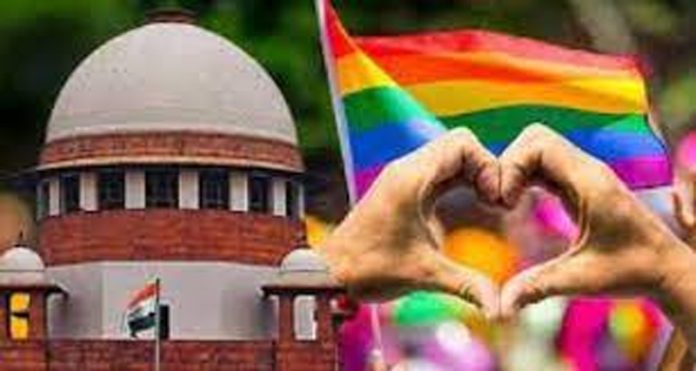NEW DELHI, Oct 17:
A five-judge constitution bench of the Supreme Court today unanimously refused to accord legal recognition to same-sex marriage under the Special Marriage Act, ruling that it is within Parliament’s ambit to change the law for validating such union.
The top court, however, recognised equal rights for queer people and their protection, while calling for sensitisation of the general public so they don’t face discrimination.
The Apex Court, while passing four separate verdicts, was unanimous in holding that there is “no unqualified right” to marriage, and same-sex couples can’t claim it as a fundamental right under the Constitution.
The bench headed by Chief Justice D Y Chandrachud was critical of the Centre’s stand that the pleas for legal validation of same-sex marriage was reflective of an urban elitist concept.
Queerness is neither an urban nor an elite concept or characteristic, said the Apex Court, which pronounced the verdicts on 21 petitions seeking legal sanction for same-sex marriages.
It, however, differed on certain aspects, especially on the applicability of adoption rules for queer couples.
The five-judge bench comprising the CJI, and Justices Sanjay Kishan Kaul, S Ravindra Bhat, Hima Kohli and P S Narasimha concurred on the main issue that the court can’t accord legal validation to same-sex marriage under the Special Marriage Act, and said the task has to be performed by Parliament.
However, Justices Bhat, Kohli and Narasimha, in two separate judgements, differed with the CJI and Justice Kaul on certain legal aspects.
The CJI said adoption regulations are held to be void as they are discriminatory towards queer people and denied them the right to adopt as a couple.
Differing with the CJI’s opinion, Justice Bhat held just because queer couples are not allowed to adopt a child does not mean that the regulations are void.
The LGBTQIA++ persons, who had won a major legal battle in 2018 in the Supreme Court which decriminalised consensual gay sex, had moved the apex court seeking validation of same-sex marriage and consequential reliefs such as rights to adoption, enrolment as parents in schools, opening of bank accounts and availing succession and insurance benefits. However, the top court left all these for Parliament to decide.
The CJI, whose views were supported by Justice Kaul in a separate verdict, recorded the Centre’s submission that it will set up a committee headed by the cabinet secretary to examine the administrative steps that could be taken for addressing “genuine humane concerns” of same-sex couples without going into the issue of legalising their marriage.
The CJI said the court can’t make law but only interpret it and it is for Parliament to change the Special Marriage Act.
Agreeing with the views of the CJI and Justice Kaul, Justice Bhat said the Constitution does not grant a fundamental right to marry.
At the outset, Justice Chandrachud said there are four judgments — by himself, Justices Kaul, Bhat and Narasimha — in the matter.
Directing the Centre, states and Union Territories (UTs) to ensure the queer community is not discriminated against, the CJI said queer is a natural phenomenon known for ages and is neither urban nor elitist.
Justice Kaul said he agrees with the CJI on grant of certain rights to queer couples.
“Non-heterosexual and heterosexual unions must be seen as both sides of same coin,” Justice Kaul said, adding legal recognition of non-heterosexual unions is step towards marriage equality.
Delivering his verdict on the critical issue, the CJI said it is for Parliament to decide whether there is a need for a change in the Special Marriage Act regime.
“This court can’t make law. It can only interpret it and give effect to it,” he said.
While reading out the operative portion of his verdict, Justice Chandrachud directed the Centre, states and UTs to take steps to sensitise the public about the rights of queer people and ensure that sex reassignment surgeries are not performed on inter-sex children at an age they cannot fully comprehend the consequences.
The CJI also directed police to conduct preliminary enquiry before registering an FIR against queer couple over their relationship.
He said homosexuality or queerness is not an urban concept or restricted to the upper class.
To imagine queer as existing only in urban spaces would be like erasing them, Justice Chandrachud said, adding queerness can be regardless of one’s caste or class. (PTI)
Trending Now
E-Paper


